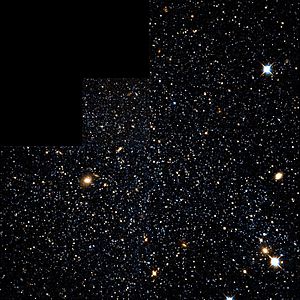Phoenix Dwarf facts for kids
Quick facts for kids Phoenix Dwarf Galaxy |
|
|---|---|

Phoenix Dwarf by Hubble Telescope
|
|
| Observation data (J2000 epoch) | |
| Right ascension | 01h 51m 06.3s |
| Declination | ±-44° 26′ 41″ |
| Redshift | 60±30 km/s |
| Type | Irregular IAm |
| Apparent magnitude (V) | 13.1 |
| Notable features | Satellite galaxy of the Milky Way with an inner part of young stars |
| Other designations | |
| ESO 245, G 007, PGC 6830, SPB93 30 | |
| Hans-Emil Schuster and Richard Martin West | |
| See also: Galaxy, List of galaxies | |
The Phoenix Dwarf is a small galaxy that was first thought to be a globular cluster (a big ball of stars). Scientists later realized it was actually a galaxy! It is located about 1.14 million light-years away from Earth. This makes it one of our cosmic neighbors in space.
Contents
What is the Phoenix Dwarf Galaxy?
The Phoenix Dwarf is a type of galaxy called an irregular galaxy. This means it doesn't have a clear, organized shape like a spiral or an oval. Instead, it looks a bit messy, with stars scattered around.
Stars Inside the Phoenix Dwarf
This galaxy has a mix of stars. Some stars inside it are very young, and they tend to be found in a line going from east to west. Other stars are much older, and they are mostly found in a different direction, from north to south. This mix of young and old stars helps scientists learn about how galaxies form and change over time.
A Neighbor of the Milky Way
Scientists believe the Phoenix Dwarf is a satellite galaxy of our own Milky Way galaxy. This means it's like a smaller friend or companion that orbits around the much larger Milky Way. Many big galaxies, like ours, have smaller satellite galaxies orbiting them. Studying these small galaxies helps us understand the history and growth of bigger galaxies.
Discovery of the Phoenix Dwarf
The Phoenix Dwarf galaxy was discovered by two astronomers, Hans-Emil Schuster and Richard Martin West. They found it in 1976. It's named after the Phoenix constellation, which is where it appears in the night sky.
Exploring More About Galaxies
If you want to learn more about galaxies and space, check out these resources!
 In Spanish: Enana de Fénix para niños
In Spanish: Enana de Fénix para niños

